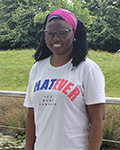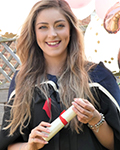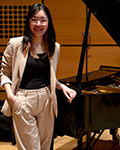MA Digital Teaching and Learning Student and Alumni Profiles
These student and alumni profiles explain why describe why our students chose to study at the University of Nottingham, their experience of the course and how it has helped develop their career. Click below to read about:
 Sylvia Olayinka-Olaniyi
Sylvia Olayinka-Olaniyi
Year of graduation: 2023
Home country: Nigeria
Studied: Full-time
Why did you choose this course at the University of Nottingham?
I chose the University of Nottingham because the content of the MA Digital Teaching and Learning course is in line with my future career aspirations. The multicultural environment of the school was another reason for my choice - you get to meet students from different backgrounds which is good for international students.
How do you hope the course will help you with your career?
I absolutely love my course, I am proud to say that I have gained new skills and competencies for a variety of career pathways. There were lots of design practice exercises which has prepared me for an exciting future and career in learning design and I am confident and looking forward to taking on the opportunities out there.
Was there a particular module that you enjoyed the most?
Learning Theories was my favourite, the course opened me up to a new way of thinking and considerations when designing learning for impact. It has helped to focus my attention more on the learner and not just on the subject. With that mindset, I am going into practice with the goal of designing learning programmes that will deliver improved learning experiences and help people become better versions of themselves.
What was the best part of the course?
The best part was the multicultural context of our class community. It was great making friends with people from different cultures and backgrounds who have become part of my life. I cherished the experience when I hosted friends from my study group to a cooking timeout. We cooked assorted Asian foods, listened to music from Sudan, Vietnam, China and Nigeria. We had so much fun and decided to learn how to make the food from each of the countries represented before the end of our course. These experiences will go with me into the future, now I can confidently travel to each of these countries knowing that I have friends from there.
How have you been supported on the course?
The lecturers kept us engaged, this helped to hone my skills. Also, frequent feedback on class activities helped me to improve in subsequent assignments. We also enjoyed a great relationship with our lecturers.
Why do you think students should come to the University of Nottingham to study this course?
The course provides an excellent opportunity to gain deep insight on the science of learning and innovations in the field of education. The seminar structure allows students to collaborate on tasks, share diverse perspectives and experiences and make friends.
Do you have any advice for someone studying the course?
Go for it!!! You will gain the most from the course if you actively participate and engage with lectures and peers in class.
Louise Costigan
Year of graduation: 2024
Home country: UK
Studying: Part-time
Why did you choose this course at the University of Nottingham?
I had thought about studying for a masters for a while but couldn’t find a course related to education that interested me. After integrating more digital methods of teaching during Covid I could see this would become more important in educational pedagogy and the University of Nottingham were the only university in the local area that combined digital technology with education so it was a natural progression to study here. The university also has an excellent reputation!
How do you hope the course will help you with your career?
I am a mature student so this proves that age isn’t a barrier to studying at a higher level. It has given me confidence that I still have skills to offer in the workplace and that my practice is current. It’s good to continue to challenge yourself.
Is there a particular module that you enjoyed the most?
I have enjoyed all of the units but perhaps the one I have enjoyed the most is The Future of Digital Education. This opened my eyes to all the amazing and exciting ways that new technology can be used to transform teaching and learning in the future. It was fun to then think about how this can be applied and adapted to our own teaching practice.
What is the best part of the course?
I’ve loved researching new ideas on digital teaching and learning. I have also made some really great friends, we have supported each other on the course through sharing ideas and also helped to keep each other on track.
How have you been supported on the course?
All of the teaching material is on moodle so fully accessible at any time which is so important when you are part-time and juggling a job and family. The staff were also flexible and enabled me to choose module times that worked around my teaching so I could attend the classes.
You also have access to a one-to-one tutorial per module to discuss your assignment which I found helpful to make sure I was on the right path.
How are you balancing studying with a job/personal life?
I work as a lecturer part-time and have a busy home life with two teenage boys so sometimes it was hard to stay on track but I found that scheduling specific times in the week to do the work helped me focus and complete the work on time.
Why do you think students should come to the University of Nottingham to study this course?
Digital teaching and learning is such a current topic that the information you learn will definitely be used in your career. It helps you consider new technology based on its effectiveness for learning not just because it’s a form of technology. Not all digital learning activities are effective and this course helps you to develop the critical thinking skills to identify those that are.
 Arwa Omer Gadelsied Abdelrahman
Arwa Omer Gadelsied Abdelrahman
Year of graduation: 2023
Home country: Sudan
Studied: Full-time
Why did you choose this course at the University of Nottingham?
I picked the University of Nottingham because of its multicultural atmosphere and its unique learning approach, which involves more than just academic knowledge but also exploring many social activities that assist to develop a full personality that can result in changes in a person's profession and benefit communities.
My ultimate goal is to improve and develop Sudan's educational system. Therefore I felt there is no better place than the University of Nottingham to take a masters degree. Since it is founded more than 200 years ago, Nottingham University has been a preeminent academic institution, with graduating scholars who are true enablers, revolutionising vocational education and training in developing nations, as well as others who have investigated efficient learning theories and methods.
How do you hope the course will help you with your career?
Now I have the opportunity to pursue a new professional path that I had always envisioned. This course prepared me for a job as a professional learning designer, which requires a set of specialised abilities that may be acquired through familiarity with learning theories, psychological principles, and the impact of technological tools on the learning process. These special combinations of knowledge will, of course, assist me in the future in ensuring that I am accomplishing my objective of enhancing societies using technological tools based on a strong intellectual background.
Was there a particular module that you enjoyed the most?
When I applied to this masters programme, I thought I would enjoy more the The Future of Digital Education module because it contains specifically the knowledge I am seeking. But I discovered that I enjoyed Learning Theories for a Digital Age more because it gave me the base knowledge for the other modules and became the foundation of the course. I also enjoyed Social Contexts of Learning as it drew my attention to an important aspect of education which is the social part and how it improves the learning experience.
I am really thankful to the School of Education that they put a great effort into the design of the MA and the modules, they thought critically about how to organise our experience and scaffold us during it in a professional manner.
What do you want to do now you've completed your degree?
My dream would be to design solutions for a wide range of learning subjects and issues. I aspire to work in a place where clients say, “this is what we’re trying to teach, or help people learn. Give us your most creative idea.” I would love the opportunity to flex my creative muscles and use all I have learnt to make products and experiences that learners of all ages find interesting and effective. This could happen anywhere, a museum, a consultancy firm, or a company that produces these things.
What was the best part of the course?
I can't single out one excellent aspect of the course because, during my masters, I had a variety of enjoyable moments:
- Seminar opportunities where it was possible to work in groups and think more deeply about the instructional strategies and materials we might utilise in the future to advance our own nation's educational systems
- Interactions with staff, Dr Pryce Davis, Professor Shaaron Ainsworth and Professor Charles Crook, where we were able to freely express all our opinions which assisted us in expanding our knowledge. I felt comfortable sharing academic ideas or views with the teachers and I always received highly constructive feedback.
- The course was not solely centred on lectures and seminars; we were fortunate to be able to travel to London as part of the program to take part in the "Bett" event, which is the largest educational technology event. The School of Education provided us with a unique opportunity to learn how to be open to organisations, find workable solutions, and come up with original ideas relevant to our subject. I'll never forget how pleased we were and how excited we were for this adventure.
How have you been supported on the course?
I am incredibly appreciative of all the help I received during this extraordinary journey. Sadly, my beloved Sudan entered into war at the end of the second semester. When this war began, my course leader, Dr Pryce Davis, and all the module convenors in that semester offered support. I received numerous emails from them asking about my mental health, my family and whether I needed any assistance in my modules, and they assisted me in requesting an extension to the assignment deadline. Additionally, I had a lot of assistance from my peers to get through this difficult time, and they always pushed me to meet with them, attempt to communicate with them, and go to the library with them to begin working on my assignments.
Not just people from the School of Education, but also the university and the wellbeing centre sent me many emails asking about my mental health and whether I needed any type of support. I felt fortunate to be surrounded by so many kind individuals throughout this time, and I genuinely appreciate all their efforts to help me feel better.
Why do you think students should come to the University of Nottingham to study this course?
For a variety of reasons, I will advise anyone interested in the subject of educational technology to enroll in this course.
The first aspect to note is how well-organised and well-designed the module is that blends psychology, computer sciences, and education into a single program. Additionally, all module convenors are highly experienced individuals with excellent teaching abilities and extensive experience in the field, ensuring that every student will have the opportunity to explore the profession first-hand and gain knowledge that will change their lives.
Last but not least, I believe that one of the reasons to choose this course is that it encourages students to consider informal education as well as formal education. It also enables students to take advantage of the course based on their own interests and needs, which makes it very distinctive and useful for a variety of people with various objectives.
Do you have any advice for someone studying the course?
My advice to everyone who will enroll in this course is to establish positive relationships with other students and the faculty because doing so will make the experience memorable. To get the most out of the modules and make use of all knowledge and abilities in the future, try to actively participate in all course activities with optimism and passion.
Is there anything else you'd like to add about your course/time at Nottingham?
The last two things I want to add are that I particularly favoured the layout of the essays that were used as assessment tools in this masters programme. This innovative approach, in my opinion, was very helpful to me because it allowed me to engage more deeply with the content and tested more sophisticated intellectual abilities like analysis, application, and comprehension, rather than just rote memorization, which will undoubtedly help me remember all of these concepts in the future because they are deeply ingrained in my mind.
Additionally, I have always enjoyed living on the beautiful Jubilee Campus during the course. It has environmentally friendly structures and abundant fauna, has always given me a mental and psychological filter.
 Jennifer Omokhuwa Aduro
Jennifer Omokhuwa Aduro
Year of graduation: 2021
Home country: Nigeria
Why did you choose this course at the University of Nottingham?
I chose to study at the University of Nottingham because the Digital Teaching and Learning MA provided me with an amazing opportunity to learn how technology can be used to effectively serve everyone, whether students, educators, people in the workplace or even the public. We always say the world is a global village because of the rapid evolution of technology and I believe that this is an evolution that learners should also encounter in their learning experiences. We all spend so much time learning, consciously or subconsciously, whether in schools or at work. So, it only makes sense that we help learners experience what is possible and achievable if they are also going to navigate life in the evolving digital world.
I was also awarded a Developing Solutions Scholarship, which went a long way in helping me live my dream of studying the intersection of education and technology in the UK.
Understanding this intersection is important because there is so much to learn about the ways that technology makes education easier, more effective and more accessible. We have the more common tools like learning apps and gadgets, but also the less common but equally important tools, like planning and assessment software and tools for organisational learning. There are also tools for learning informally, that is, outside the classroom. We should appreciate the varied cultural implications for implementing technology in learning and even how and when the technology should be used. Studying this course gave me the opportunity to study and understand all these different ways technology influences the learning framework.
How has the course helped you in your career?
It has most certainly opened a new career path for me. My background is in occupational therapy; however, I had developed a keen interest in education, as in my practice, I saw the potential technology offered in addressing learning in kids with disabilities. So, I began exploring educational technology and I was sold. Since being on the course, I have been exposed to endless possibilities such as the use of gamification in learning, and the role of AI in the teaching and learning process. I am now interested in, and excited about, how my learning can be applied to the design of learning products and experiences that are pedagogically relevant to those who use them.
Was there a particular aspect of the course that you enjoyed the most?
I cannot single out any one thing about this course because the entire course has been a thrilling experience, and all the different aspects complement each other. I am learning from my classmates from other parts of the world, I have analysed games to identify their learning benefits, I have done a little coding with Scratch. It has been a truly wonderful experience and I have enjoyed every aspect of the course.
One of the best parts for me has been the opportunity to design solutions. Every module I have taken has required me to think of innovative and sometimes lean approaches to how technology can address specific issues of teaching and learning. On this course, I have conceptualised and designed a digital tabletop for learning at a horticultural apprenticeship, a mobile language learning app and even a mixed reality environment to teach wildlife conservation!
Every one of these tasks has challenged me in ways that has helped me grow. It has challenged me to think beyond what is available and even predict the future of education. Learning to think through the theoretical basis of these designs and finding evidence for them has been an insightful and creativity-enhancing learning experience.
What do you want to do now you've completed your degree?
My dream would be to design solutions for a wide range of learning subjects and issues. I aspire to work in a place where clients say, “this is what we’re trying to teach, or help people learn. Give us your most creative idea.” I would love the opportunity to flex my creative muscles and use all I have learnt to make products and experiences that learners of all ages find interesting and effective. This could happen anywhere, a museum, a consultancy firm, or a company that produces these things.
Have you undertaken any work experience or a placement while studying?
I have been working as a Covid-19 vaccine hub administrator since December 2020 and it has been a wonderful experience. It has given me some exposure to the UK workplace and taught me new things about time management. I have had to employ new strategies to effectively manage working and studying. It has also given me a renewed sense of appreciation for everyone, especially frontline workers who have had to rearrange their lives to ensure that the school community and the public are all safe during this period. The sense of support and community displayed at work daily is second to none and I am grateful for the opportunity to be a part of it.
Why do you think students should come to the University of Nottingham to study this course?
The tutors. I honestly believe I have the best tutors in the entire university. Their research backgrounds come from different learning fields, which provides the perfect balance to the course. If you are interested in social learning, or learning in informal spaces or artificial intelligence, there are renowned tutors in these areas for you. They are not just experts in their fields, they also bring this excellence to the class, and in the way they teach and encourage critical reflections and discourse. They go above and beyond to ensure that the learning experience is as rich as possible and trust me, that is no easy feat to achieve virtually when learning was originally designed to be in-person.
Is there anything else you'd like to add about your course/time at Nottingham?
The Digital Teaching and Learning MA programme here at the University of Nottingham is an amazing opportunity to learn how technology can be used to effectively serve everyone, whether students, educators, people in the workplace or even the general public. I would recommend it for anyone considering it.
The school also has wonderful system in place to support different aspects of student life. On two different occasions, I have had some troubles with my laptop, and I was always able to drop it off for repair with the laptop loan and repair team, and loan a laptop from them, all for free. It is a service I am constantly grateful for.
Plus, Nottingham is a very lovely town, with a great transport system that allows you visit the many wonderful sites and spaces around the town. I have had a good time here despite the lockdown and I can’t wait to explore it some more as soon I get some time off.
 Victoria Adams
Victoria Adams
Year of graduation: 2021
Home country: England
Why did you choose this course at the University of Nottingham?
The University of Nottingham has a very high reputation and is recognised worldwide as part of the Russell Group.
One thing that particularly drew me to the university, were the campuses. Both University Park and Jubilee Campus are surrounded by lots of open green areas, as well as the lakes, which are really beautiful and peaceful to walk around – of course you can’t forget about the Beasts of Nottingham!
I also liked the different opportunities and services that the university has to offer. For example, there are the year abroad and exchange student opportunities, where you can go and study in a partnership university. Similarly, there are lots of different societies which you can become a part of, different enrichment afternoons (such as sporting competitions), and numerous events which the university has to offer – outdoor cinema screenings, online Harry Potter quizzes, bar crawls, to name but a few.
How has the course helped you in your career?
I initially studied my undergraduate psychology degree at the University of Nottingham. During this time, I selected the additional module ‘Learning and Development’, which was led by the School of Education. I really enjoyed exploring this module and how my psychology degree could be applied to real-world contexts.
Now, during my masters, I feel like I have gained the skills and confidence to pursue a career in teaching. The course has allowed me to understand the influence of digital technologies, and how they can be applied to different learning environments. This is has led me to pursue a career in primary education.
Was there a particular aspect of the course you enjoyed the most?
This year has been challenging due to Covid-19, however, the lecturers have gone above and beyond to provide practical examples of different technologies within learning. For example, we have looked at online collaborative software such as ‘VoiceThread’ and ‘Knowledge Forum’, to explore how you can collate and present information to other people online. We have also looked at the online website ‘Scratch’; we explored how children learn to code by making their own animations, games, and online stories.
Another aspect is the new people that you meet. The course is very multi-cultural and I have made friends with people living in countries such as the UK, China, and Africa. We have compared teaching/learning experiences in the different countries, and have been able share our own personal traditions within each culture – for example Christmas and the Chinese New Year.
What are your plans once you've completed the course?
I have recently gone through the application and interview process for Initial Teacher Education, and have accepted a place on the Primary PGCE course offered by University of Nottingham.
I am hoping to bring the knowledge and skills that I have acquired over the last four years at the University of Nottingham into my own classroom/learning environment.
What was the best part of the course?
As previously stated, one of the highlights of this course is the hands-on experience you get using different technologies and digital software. You don’t just look at the theories which underlie learning, but you also explore the practical applications of technologies across a range of settings – for example primary/secondary schools, higher education, and even museums.
There is also a lot of freedom on this course. You get an influence on which technologies you particularly want to focus on (such as haptics, tangibles, and simulations), and how you want to apply them within different activities.
The course is also coursework-based, so there are no pressures of exams. You have the freedom to explore your own ideas (in terms of educational issues, and different technologies) within your essay and dissertation work. All the tasks you complete are carefully planned out, so you never feel like you are in the deep end. With each assignment, you are given the opportunities to create an initial proposal and are provided with really helpful feedback from your lecturers and peers.
The support you receive during the course isn’t just leading up to your assignment deadlines but is also across the whole university year. You are provided with a personal tutor/supervisor, who you form a close and friendly bond with. They have regular meetings with you, to ensure you are being correctly supported throughout the year.
Did you undertake any work experience or a placement while studying?
During my undergraduate degree, I completed work experience at both a primary and secondary school. This gave me experience in different education environments, and with different student populations. For example, I worked within a KS1 classroom and had worked with a child who had autism. I was able to bring my experiences to my masters degree, where I considered how I would incorporate technology into different primary-school classrooms.
As I’m already fairly local to Nottingham, I was also able to gain additional work experience with my local theatre company; I was a choreographer for their 2019 show. This gave me more confidence and independence in teaching and leading a large group of individuals, ranging in ages and abilities. It also helped me to develop my problem-solving skills, as well as my time management and organisation, so I could complete this extra-curricular activity alongside my studies.
Why do you think students should come to the University of Nottingham to study this course?
Nottingham is an excellent university – both in terms of teaching and student experience. You have access to a range of building and facilities (including Portland, Lakeside Arts, Sports centres/gym, Innovation Park) and are provided with lots of opportunities to get involved with different activities – both inside of outside of the university. As previously mentioned, there are student competitions (such as Sports Varsity), societies (I was a part of the Ballroom and Latin society), and opportunities for travel (campus exchange programmes and local day trips). I have also recently gone out onto the boat lake on University Park campus, which is a great day out in the warm summer weather.
The university is also situated just outside of the city centre, which is only a short tram or bus route away, for shopping, nights out, ice-skating, or to explore the legend of Robin Hood.
In terms of the course itself, I believe that it offers you invaluable experience for the real world. It isn’t just applicable for those wanting to teach within schools (primary, secondary, and post-education), but also for those interested in informal learning contexts – such as museums, art galleries, medical practices, and businesses.
You develop transferable skills, which are key within the 21st century – especially one that is becoming growingly more digital. You get to experience first-hand the technologies, which are currently available within learning contexts, and what the future of digital education is likely to look like.
Is there anything else you'd like to add about your course or time at Nottingham?
Throughout my masters I was also a Course Representative. I had to collate the opinions of my fellow peers and present these to staff within the School of Education. I also attended termly meetings within the wider university community, where I got to explore what was happening in other departments, as well as higher up (such as within the Student’s Union). I also worked closely with my course leader to ensure that students’ voices were being heard, and that necessary changes and improvements were being made to ensure that all students have received a high quality student experience.
Overall, I have thoroughly enjoyed my experiences at the University of Nottingham. I think the fact that I have continued studying here for my undergraduate, my masters, and now for my PGCE (2021/22) just highlights how excellent the university really is. You feel a part of a community, and receive high-quality teaching and support throughout your whole university experience.
 Nguyen Phuong Le
Nguyen Phuong Le
Year of graduation: 2023
Home country: Vietnam
Study: Full-time
Why did you choose this course at the University of Nottingham?
I chose the course based on the course duration, location, the university ranking and scholarship opportunities.
How do you hope this course will help with your career?
I am currently applying for jobs and would like to work in the higher education sector. I'd also like to do a PhD in the future.
Is there a particular module you enjoyed most and why?
I enjoyed The Future of Digital Education, as I got to learn education from different methods and compose an assignment for a future curriculum using digital technology.
Was there a particular aspect of the course that you enjoyed the most?
Sharing ideas with tutors and other like-minded classmates was nice and helps when formulating ideas for assignment writing.
How have you been supported on the course?
Tutoring sessions were helpful for me. Casual talks with professors outside of class time reassured me and made me feel more confident.
Why do you think students should come to the University of Nottingham to study this course?
It is an exciting course that intertwines between digital technology and educational theories.